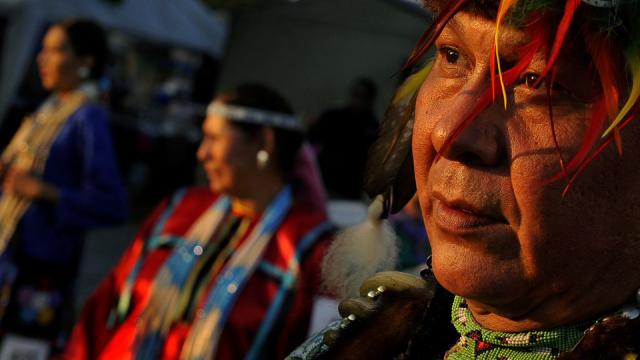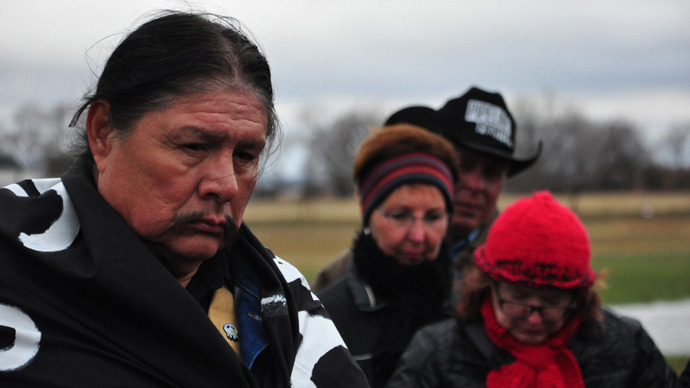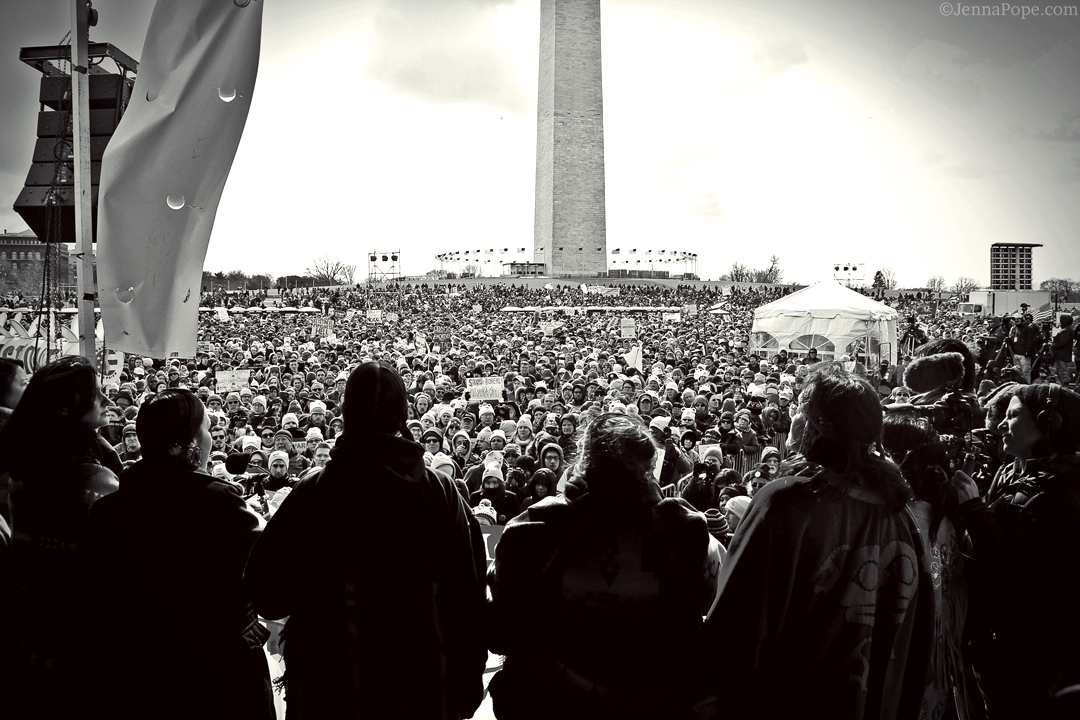
Art and Helen Tanderup's 160-acre farm in northeast Nebraska is crossed by two invisible lines, one from the past and one from the future. The first crossing was in 1877, when the Ponca Tribe were forced on a brutal march to a new reserve some 500 miles south, during what is now called the Ponca Trail of Tears.
Now, the Tanderups fear their farm may be crossed once again—this time by the Keystone XL pipeline, whose proposed route traces the Poncas' path from so many years ago. And so, from November 8 to 11, they welcomed onto their land the Ponca Trail of Tears Spiritual Camp, a ceremonial gathering of natives and non-natives who are determined to prevent the pipeline's construction—and who see in it echoes of a dark colonial history.
Finding common cause over the desire to protect land and water, and sharing a wariness of both government and industry, the participants grieved the past and prayed for the future. The camp—one of several planned for this winter—signifies a new phase in the growing solidarity between the Native Americans of the Great Plains and their non-native neighbors, all united in opposition to the Keystone pipeline.
The project's opponents believe that tar sands crude is more dangerous than regular oil because it's highly toxic, corrosive, more likely to spill—and more difficult to clean up. They cite major recent tar sands spills in Arkansas and Michigan. The southern leg of the pipeline, which connects tar sands stored in Oklahoma to refineries in east Texas, is already under construction by the Canadian pipeline company TransCanada. What now hangs in the balance is the northern segment that would bring the pipeline up to full capacity, ensuring a direct link from the tar sands to U.S. refineries and markets overseas.
Art Tanderup points out that the pipeline still threatens the Ogallala Aquifer that provides fresh water to eight states, despite a recent rerouting designed to avoid sensitive areas. TransCanada, which has used the power of eminent domain to claim private land for an infrastructural project that's considered "public use," has left landowners who oppose the project little legal recourse.
Faith Spotted Eagle, an elder of the Ihanktonwan Dakota/Nakota tribe and one of the camp's organizers, testified in a State Department hearing on April 18 that TransCanada and the U.S. government have neglected their duty to consult with them as sovereign peoples on matters that affect their traditional land, as outlined by the EPA.
For her and for many other native elders, though, this pipeline project is part of a longer history of colonialism, broken treaties, and resource extraction on indigenous land. It's about sacredness of that particular route—"for the dead, the ceremonial sites, and tribal lifeways." Both ranchers and natives say that the pipeline threatens the land in which they base their deeply rooted cultural and spiritual identities.
Naturally, the land was the focus of the spiritual camp. Residents from all along the proposed pipeline route sang songs, told stories about what the land meant to them, and talked about why they were so determined to protect it. They set up the tipi, shared meals, and kept watch over the sacred fire so that it burned continuously through the night. Some brought their children and grandchildren.
For many of the non-natives who sat around the fire, it was the first time they'd interacted with the tribes. Jane Kleeb, executive director of Bold Nebraska, an organization that opposes the pipeline and which co-sponsored the camp, says she is certain that Keystone catalyzed the growing alliance between the two groups. "It would have never happened if TransCanada hadn't come knocking on our doors."
Mekasi Horinek, a Ponca who brought his two youngest sons to the camp, grew up on the reservation in Oklahoma where his ancestors were relocated. "Living on the res, it's usually us against them," he said. "You kind of grow up with that mentality."
Horinek sees that the white ranchers and landowners, threatened with eminent domain and the loss of the right to their own land, are beginning to understand what the tribes like the Ponca experienced during colonization. "This pipeline is dividing the land," he says, "but it's bringing people together."
Kleeb agrees that natives and ranchers have more in common that one might think. They share not only a fierce independence, but pride in the land that's the source of both culture and livelihood. "They're very much cut from the same cloth," she says. Or, as Art Tanderup put it, "It's more than an 'us' and 'them'—it's turning into a 'we.'"
This sense of solidarity with the tribes has been growing among ranchers and white landowners across the region. Some the camp's organizers are part of a group that calls itself the Cowboy and Indian Alliance. While the "New CIA" is more of an identity than a formal organization, people associated with the group have been speaking out against the pipeline frequently at hearings, protests, and at a landmark climate rally in February in Washington, D.C.
Though they are fighting Keystone through every legal and political channel that's open to them—and though some have promised to physically block it, if the time comes—they believe their campaigns are only as strong as their trust in one another.
When the camp was over and the tipi packed up, participants—who numbered about fifty in total—hadn't just strengthened their commitment to a campaign, but also to each other.
"I think that's where the real trust is built," says Kleeb, "so that when we have to go face to face with TransCanada, we're all prepared as a unified force."
3 WAYS TO SHOW YOUR SUPPORT
- Log in to post comments


















